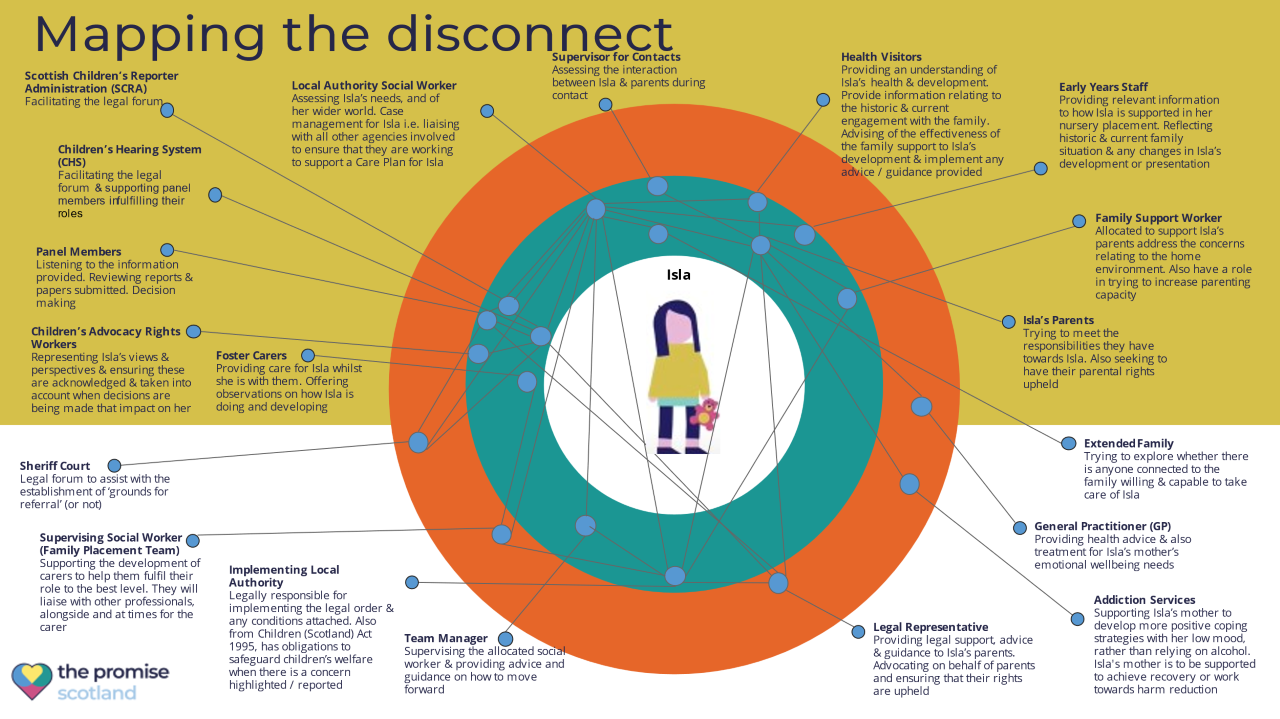What data does Scotland collect and analyse that directly and indirectly impacts the lives of children and their families, and how can we best map it?
The Issue
In February 2020, the Independent Care Review, a root and branch review of Scotland’s ‘care system’, published its conclusions as a set of seven reports - primary of which was the promise report. Many of the organisations which engaged with the Care Review identified challenges with data collection, access and sharing as barriers to supporting children and families and meeting their needs.
Data collection and analysis often focuses on measuring what matters to the ‘system’, rather than what matters to children and families. What it captures is too narrow and doesn’t reflect the whole context of children and their families lives, and the relationships that are important to them. Data is fractured, disconnected and incomplete.
Scotland must #KeepThePromise it made to children and families - a cohesive picture of all the data on processes and systems that directly and indirectly impact children and families will help Scotland understand how to do that.
Why Does it Matter?
The Care Review was guided by the voices of children, young people and families, who shared their, often painful, experiences in the hope of change. Central to that change is embedding an approach to family and care that will mean Scotland can truly be ‘the best place in the world to grow up’, reflecting Scotland’s existing commitment that all children ‘grow up loved, safe and respected so they can fulfil their potential’.
This change must involve the whole landscape of systems and services that interact with children and families – what is currently referred to as a ‘care system’. But the current data systems are not good enough to support the monitoring and evaluation of progress either nationally or locally and are not capable of supporting progressive transformational change.
When gathering data about a child’s journey through care, Scotland collects and assembles its data around ‘episodes’ of care rather than the entirety of a child’s care experience. This may hit the target from a service delivery position; but misses the point - and value - of experience entirely. Over 50% of Scotland’s children show as having a single ‘episode’ of care because data is not joined up and they are seen as entries and exits to and from the care system - rather than people moving in, out and through it. An emphasis on ‘outcomes’ comes at the expense of understanding the whole journey. A lack of cohesion and ineffective use of technology across data systems means children and families are asked to share and reshare the same, often traumatic, information. This is compounded by narrow definitions of the ‘subject’ of the ‘care system’, which means the larger context of children’s lives - their families, their communities - isn’t captured, making it difficult for progress to be monitored.
The result is that children and their experiences are reduced to numbers that fail to reflect their lives. Scotland recognises the importance of whole family support - this needs to be reflected in how data is collected too. Children, young people and families told the Care Review what mattered to them - to transform how Scotland cares, that is what must be measured.
Our Project
This project aims to build a cohesive central picture of all data in processes and systems that directly and indirectly impact children and their families in Scotland. Uniquely, this project approaches the mapping exercise from the perspective of 'what matters' to children and families, as opposed to being driven by the organisations and systems that currently exist.
The team is working to identify what data to capture, who to capture it from and how best to capture the information, before testing and repeating through an iterative development loop. This will set the groundwork and build the methodology necessary to construct a data map that facilitates information capture across a broad range of stakeholders.
This phase of the project aims to to:
Build an understanding of existing mapping efforts and related work
Develop a mapping model that captures ‘what matters’ to children and families in a structured format
Conduct a stakeholder mapping exercise to identify appropriate organisations
Develop a suitable methodology to gather information about the data
Work with local authority partners to build and iterate the model
The overall goal of this piece of work is to equip Scotland with a cohesive central picture of all data on the processes and systems that directly and indirectly impact on children and their families, including wider socio-structural factors.
Our Outputs
This project was developed as part of our Impact Collaborations process.
More about the promise
From The Promise Scotland website.
Isla's story
It's easy to say the "care system" is confusing for children to experience. But it's hard to feel what the reality of that is like unless you see it for yourself.
That's why The Independent Care Review created Isla's story. It shows how the system looks from inside, for a care experienced, 10-year-old girl.
It's a composite story, made up of the experiences of lots of real children. Isla herself isn't real, but what happens to her reflects events which did really happen.
Isla's story is made up of the real stories of care experienced children across Scotland. It shows some of the challenges they face in "the care system" as it exists now.
But Scotland has made a promise to children with experiences like Isla's, to make sure they grow up loved, safe and respected.
Find out about the promise at http://thepromise.scot
Isla’s story before the promise is kept
Isla’s story once the promise is kept





